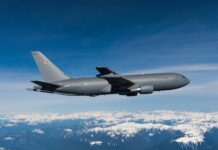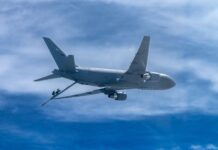Kelly Ortberg steps into the hot seat as Boeing’s new CEO
Peter Felstead
Boeing announced on 31 July 2024 that its board of directors had elected Robert K ‘Kelly’ Ortberg as the company’s new president and chief executive officer (CEO), effective from 8 August.
Ortberg, who will also serve on Boeing’s board of directors, succeeds Dave Calhoun, who earlier this year announced his intention to retire from the company, having served as president and CEO since January 2020 and as a member of Boeing’s board of directors since 2009.
“The Board conducted a thorough and extensive search process over the last several months to select the next CEO of Boeing and Kelly has the right skills and experience to lead Boeing in its next chapter,” Steven Mollenkopf, Chair of the Board, was quoted as saying in a Boeing press release. “Kelly is an experienced leader who is deeply respected in the aerospace industry, with a well-earned reputation for building strong teams and running complex engineering and manufacturing companies. We look forward to working with him as he leads Boeing through this consequential period in its long history.
“The Board would also like to thank Dave Calhoun for his strong leadership at Boeing, first as chair and then as CEO, when he stepped in to steer the company through the challenges of recent years,” added Mollenkopf.
Those “challenges” have seen Boeing dealing with issues on both the military and civilian side of the business. On 31 July 2024 Boeing recorded second-quarter revenue of USD 16.9 billion (EUR 15.48 billion), generally accepted accounting principle (GAAP) loss per share of USD 2.33 and core loss per share (non-GAAP) of USD 2.90. Boeing stated with the release of those financials that the results “primarily reflect lower commercial delivery volume and losses on fixed-price defense development programs”.
For Boeing’s Defense, Space & Security business second-quarter revenue was USD 6.0 billion.
“Second-quarter operating margin of 15.2% primarily reflects USD 1.0 billion of losses on certain fixed-price development programs, including a USD 391 million loss on the KC-46A programme largely driven by a slowdown of commercial production and supply chain constraints. Losses recorded on the T-7A, VC-25B and Commercial Crew programs reflect higher estimated engineering and manufacturing costs, as well as technical challenges,” Boeing stated.
Core among Boeing’s problems on the military side have been issues with the US Air Force’s (USAF’s) KC-46A Pegasus aerial refuelling tanker, which have led to charges that have already exceeded USD 7 billion on the fixed-price-contract programme.
On the civilian side Boeing has suffered from years of safety issues after two Boeing 737 Max airliners crashed in 2018 and 2019, killing 346 people. Then, on 5 January 2024 a mid-exit door (MED) plug of an Alaska Airlines Boeing 737 Max 9 blew out in mid-flight, forcing an emergency landing.
As a response to that incident Boeing on 30 May submitted a Safety and Quality Plan to the US Federal Aviation Administration (FAA) designed to address what the FAA had called “systemic quality-control issues”.
Boeing’s renewed focus on safety also led the company to declare on 1 July that it had entered into a definitive agreement to acquire Spirit AeroSystems, which was founded in 2005 when Boeing sold its Wichita division and Oklahoma operations, thus bringing Spirit’s Boeing-related work back under direct control.
On the military side, meanwhile, Boeing is betting big on a new 1.1 million square-foot factory to support future combat aircraft programmes on which ground was broken at the turn of the year. Expected to be completed in 2026, the USD 1.8 billion factory, which will nearly double the company’s manufacturing footprint at its site near St Louis Lambert International Airport, is intended to revolutionise how military aircraft are designed, built and delivered by Boeing by employing state-of-the-art digital tools and advanced manufacturing techniques.
The most obvious driver for the new facility is the USAF’s Next Generation Air Dominance (NGAD) programme. However, while the USAF released a request for proposals for an NGAD engineering and manufacturing development contract in May 2023, with an expected contract award in 2024, that is yet to happen.
As Boeing’s new CEO, Ortberg will thus need to ensure the company’s Safety and Quality Plan sticks, with a near-religious adherence to quality control, while on the military side overseeing the gaining of new business that offsets the losses caused by Boeing’s errant fixed-price contract programmes.







![Heavy-lift rotorcraft: Where US hegemony meets the tyranny of distance The latest model of the Chinook, the CH-47F Block II, is expected to be in service into the 2060s, by which time successive models of the Chinook will have been in service for more than 100 years. [Boeing]](https://euro-sd.com/wp-content/uploads/2025/11/CH-47F-Block-II-Boeing-Kopie-218x150.jpg)


![Hypersonic weapon interceptor developments The US MDA plans to conduct Flight Test Aegis Weapon System-43 (FTM-43) with the goal of using an upgraded Standard Missile-6 (SM-6) to physically intercept an HTV-1 hypersonic target. [MDA]](https://euro-sd.com/wp-content/uploads/2025/09/SM-6-_-8314132-Kopie-218x150.jpg)


